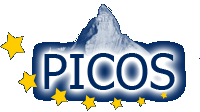Taxonomy
This deliverable serves as an inventory of common terminology on trust, privacy and identity related aspects of identity management. The terminology included in this deliverable has been established within the PICOS consortium and attempts to consolidate the different perspectives in a multidisciplinary report. The terms included in this deliverable are considered as working definitions and aim at providing a common understanding among the project partners of the main with regard to the terminology used in the project.
The work in this area of PICOS lead to a comprehensive taxonomy document, which includes definitions of terms related to communities and usability, electronic and mobile, communications terminology, privacy, identity management and trust, legal/data protection aspects, architecture and technical aspects and assurance of technical trust and privacy properties. The definitions range from rather broad terms such as “Social Network” or “Mobile Community” to more specific ones like “Sensitive Data” or “Privilege Policy”. The deliverable is completed by chapters related to the exemplarily communities of anglers and gamers, which were a necessary addition, due to a number of particular terms and definitions.
Please see the respective Deliverable for full details.
Community Categorisation
As we experienced also in the context of the taxonomy elaboration, especially the term “online community may be defined in various ways. For example internet forums, blogs, dating sites, chat rooms are considered to be online communities by some parties, whereas others only take dedicated social networking sites such as Facebook, MySpace or Friendster into account. Since PICOS focuses on online and mobile communities, a structured approach that identifies conceptualises and describes different types of communities is needed.
Hence, the “Categorisation of Communities” was conducted as the 2nd deliverable within this phase. Besides summarizing the state of the art on community categorization and clustering approaches, it provides a detailed categorization of communities, according to criteria that are relevant for the management of trust and privacy and thereby relevant in the context of PICOS. Furthermore implications and consequences related to trust, identity and privacy are identified. These provide an important input to the deliverable D2.4 (Phase 2), which analyses and defines the PICOS requirements in detail.
Please see the respective Deliverable for full details.


